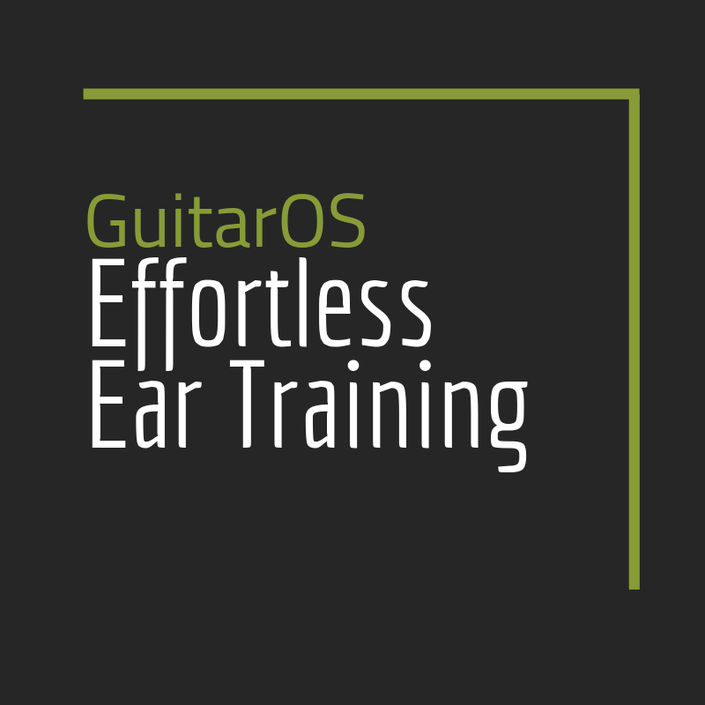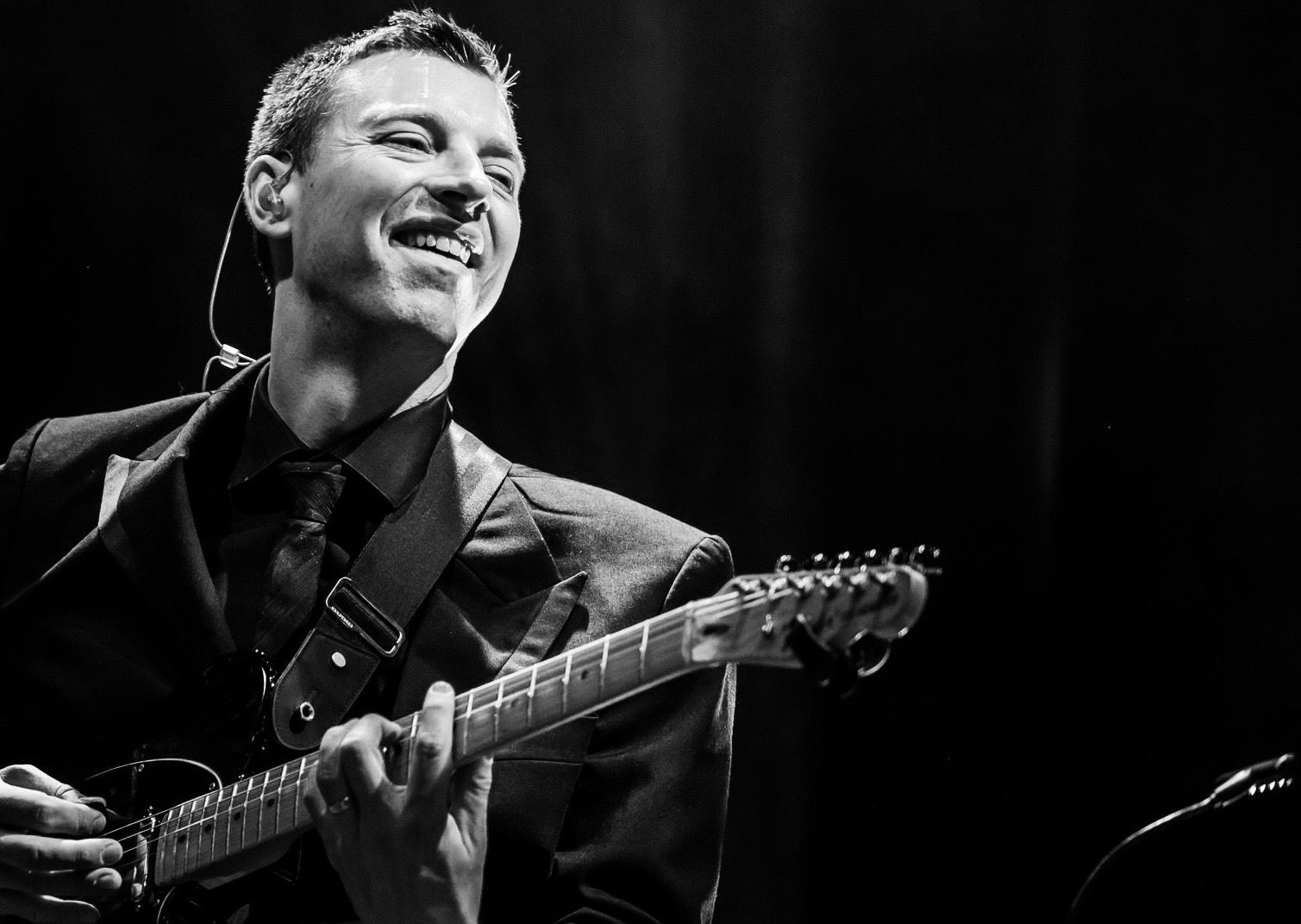
Effortless Ear Training (v2)
Develop Professional-Grade Ears In Five Minutes A Day
The difference between great musicians and just-ok musicians is their ears.
Once upon a time, the only way to learn something on guitar was by ear.
The vast majority of our guitar heroes learned this way. Ear straining training is still the cornerstone of music school education.
When free TAB first became available on the internet, we guitarists rejoiced at the newfound ease of learning.
But along the way we’ve lost something important: our ability to hear clearly, to cop licks from our favorite players, and to easily translate the sounds in our heads onto our fretboards.
- We feel trapped inside a handful of well-worn fretboard shapes.
- Our playing feels uninspired.
- We struggle to learn and remember tunes.
- Accompanying someone on a tune we don’t know is a crapshoot.
- We can’t sing harmony.
- We have friends who can hear a song once and imitate it, while we’re stuck looking up the TAB or chords.
We know we should be training our ears, but all the apps & courses are designed for people with formal music training, and they’re filled with cheesy synthetic piano sounds & fussy music school vocabulary.
Worse still, when we do take the initiative to tackle ear training, we work for weeks with nothing much to show for it. It’s a recipe for demotivation.
I know because I’ve been there.
Effortless Ear Training teaches your ears to instantly discern what’s going on in the music you hear so you can play it without hesitation.
No intense study sessions, no workbooks, no arcane terminology, no endless parade of soul-crushing exercises.
Just a clearly defined, do-this-one-thing-today approach that’ll take you five, maybe ten minutes each day.
With each passing day, you’ll feel noticeably more confident in your abilities. Learning riffs & solos by ear will get easier. You’ll hear a song for the first time and immediately know the chord progression.
How important is ear training?
I believe it’s the missing link for most modern players.
Think about it.
Jimi Hendrix.
Duane Allman.
The Beatles.
Prince.
Danny Gatton.
Stevie Ray Vaughan.
They all made timeless, transcendent music without learning any organized theoretical system.
You know what that generation had in spades that we don’t?
Keen ears.
There was no internet, no TAB books, no YouTube. Whatever they wanted to learn they had to learn by ear.
What if you had the benefit of modern learning tools AND the kind of ears that made everything fall seamlessly into place?
You can. Here’s how.
The music school method works… for people in music school.
You know, the best handful of prospective students, selected from a huge pool of applicants, fully immersed in mutually reinforcing theory, ear training, sight reading, & ensemble classes, plus private lessons, all mixed together with relentless practicing.
Four hours a day is the minimum. Eight hours a day isn’t unheard of.
They learn ear training the way a self-driving car follows its GPS: as a series of defined distances combined and recombined into directions.
Again: it works. For machines. And people with machine-like determination.
But it’s hard.
And it’s not how your heroes learned.
You’ve heard the stories:
- A barefoot Duane Allman stopping the turntable with his toe after each lick as he sussed out a whole BB King record.
- A nine-year-old Danny Gatton sounding out Foggy Mountain Breakdown on his brand new banjo in the backseat of the car on the way home from the music store.
- Jimi Hendrix asking Miles Davis what a “diminished chord” was, hearing one once, then immediately playing them all over the neck.
- Alex Van Halen returning home from a night out to find his little brother Eddie still sitting on the end of the bed, adding his personal innovations to songs he’d heard.
- Robert Plant scatting out an improvised line and Jimmy Page playing it back on guitar with near-perfect accuracy in real time.
I’ll be honest with you: I have not personally asked these folks how they developed their ears.
But I know more than few people with these sorts of abilities and they fall neatly into two camps:
- The people who went to music school and learned through (often brutal) total immersion.
- The people who had some natural ability at hearing & imitating, who then spent years working things out by ear.
If you’re either one of those, congratulations! You sure as shit don’t need my help.
But what about the rest of us?
Can people like us, without relying on natural talent, tens of thousands of dollars in student loans, and/or years of free time acquire great ears?
Yes, we can.
And it’s easy.
Your Instructor

A lucky break forced me to make the jump from "fairly decent bar band guitarist" to "professional musician" long before I was ready or qualified.
Suddenly I was surrounded by elite professional musicians, people who'd toured with huge acts and had long lists of recording credits.
It was a baptism by fire as I scrambled to quickly develop the skills & knowledge necessary to operate in this new space.
Along the way, I discovered something surprising—internet gurus and big-name music schools alike are focused on all the wrong shit.
Badass musicians the world over share a common language & a set of priorities I've never seen taught anywhere else.
It took me awhile to piece it all together & put it all in the right order.
But now that there's a clearly defined path, all that's left is for you to decide you're done with wandering blindly in the darkness, done depending on luck, ready to show up and put one foot in front of the other on the road to badassery.
I hope you'll join us.